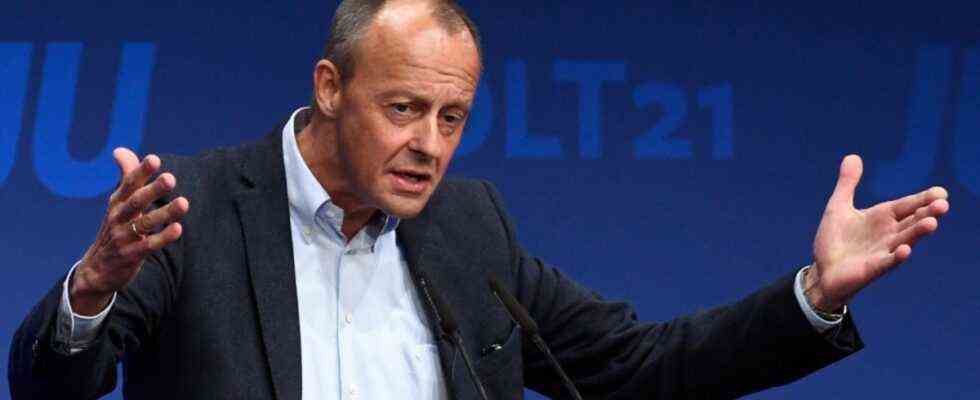There are three politicians in the front, the one on the right is second to make his statement. “I believe that what we have achieved, my colleagues may forgive me, also has a social-democratic signature to a large extent.” It is March 12, 2018 in Berlin, on the stage are Chancellor Angela Merkel (CDU), the then CSU chairman Horst Seehofer and the then SPD leader Martin Schulz. The latter led his party as a junior partner in a grand coalition – which nobody really wanted. He now has to prove that the Union’s junior partner negotiates on an equal footing – and himself against CDU and CSU prevailed.
Three and a half years later, last Friday, there are six politicians on the stage in Berlin, and again it is about a federal government. “The last few days were marked by a special style,” says FDP leader Christian Lindner, whose party will be the smallest junior partner. He had perceived a “change in political culture” that had created “spaces of opportunity” in order to together to negotiate a coalition with the SPD and the Greens. The party leaders of the SPD and the Greens talk in a similar way, no one rises above the others. One wants to form a government that is capable of dialogue, that invites, says Olaf Scholz (SPD), who wants to become the next chancellor.
It is no longer against each other, but with each other. That is the impression made by the appearance of the three potential coalition partners last Friday. No emergency government is formed here, but an alliance that arouses high expectations – and at least for the moment the feeling that it could be good.
Back then horse trading, today a departure
This is helped by the fact that – unlike the coalition agreement of 2018 – the twelve-page exploratory paper does not read like a log of a horse trade: mother’s pension for the CSU, black zero for the CDU, child benefit for the SPD. Anyone who compares the introductions to the 2018 coalition agreement and the exploratory paper from Friday will notice that the tonality is different: 2018 was about preserving vested rights. 2021 is about seeing change as an opportunity. One can clearly see the social-liberal-ecological priorities in the exploratory paper – minimum wage, entrepreneurial spirit, climate protection – but not as individual components, but put together to form a mosaic that heralds a new beginning.
The joy of the explorers is of course the grief of the underdogs of the CDU and CSU. The decision of the leaders of the SPD, FDP and Greens to start coalition negotiations has further divided the already nervous Union. “I think you have presented a considerable paper,” said Friedrich Merz (CDU), once a member of the future team of Union Chancellor candidate Armin Laschet Editorial network Germany. “This is an occasion for respect and critical self-examination: we could have had that too.” The traffic light coalition has come within reach, the paper presented jointly by the parties shows “the willingness to reach agreement and also the readiness to govern together. We should prepare ourselves to be the opposition.”
CDU General Secretary Paul Ziemiak and Union faction leader Ralph Brinkhaus had sharply criticized the agreement paper for a traffic light coalition. It contains more questions than answers, “said Ziemiak (CDU) Rheinische Post. “A lot of suggestions were simply thrown together – without specifically saying what that means for the people. In particular, the question of financial feasibility remains open.”
Union faction leader Brinkhaus sees breaks between traffic light partners
Brinkhaus criticized the lack of funding. Almost all spending requests would be fulfilled, but nowhere was it reliably stated how all of this should be paid for, said Brinkhaus. “The breaks between the traffic light partners are more than clear. The substantive basis for the traffic light is not stable.” CSU regional group leader Alexander Dobrindt spoke of “left daydreams”. The traffic light is clearly on red, he said, “tax increases for millions of citizens through the abolition of so-called subsidies and a communitisation of debts in Europe.”
Angela Merkel (CDU), on the other hand, emphasized that she believed that Europe would continue to play a prominent role in a possible traffic light coalition. You can tell the EU partners “with full certainty that it will be a government that is pro-European,” said Merkel during a visit to Brussels. “And that is an important message for the partners in the EU.”
The SPD, Greens and FDP presented a twelve-page exploratory paper on Friday in which they outlined their political goals. It does not contain specific budget or financing information; these are to be clarified in the coalition negotiations. Sven Giegold, who took part in the explorations as the EU’s financial politician for the Greens, said that “there will be a cash fall” at the beginning of the coalition negotiations. SPD Chancellor candidate Scholz had previously assured that they have and will find the leeway to finance the necessary investments, for example in climate protection.

